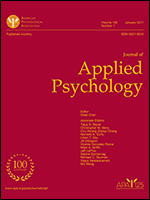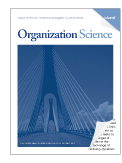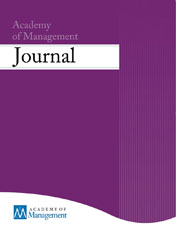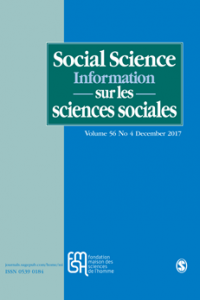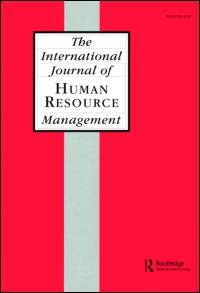De Jong B, Gillespie N, Williamson I, Gill C. (2020). Trust Consensus Within Culturally Diverse Teams: A Multistudy Investigation. Journal of Management.
Despite tremendous progress toward understanding trust within teams, research has predominately conceptualized team trust as a shared group construct, focusing almost exclusively on trust magnitude (i.e., mean level of trust) while ignoring trust dispersion (i.e., within-team differences in trust). As a result, we know little about this critical property of team trust, its determinants, and independent impact on team outcomes. We address this limitation by examining “team trust consensus”—a configural group construct capturing the extent to which team members share their levels of trust in the team—as a variable of theoretical and empirical interest in its own right. Cross-sectional data from a work team sample (Study 1, N = 120) provide initial support for our propositions that national culture diversity negatively affects trust consensus and that trust consensus positively affects team performance. Expanding on these findings, we propose a contingency model in which the negative impact of national culture diversity is mitigated by team virtuality and collective leadership. Multiwave data from an MBA team sample (Study 2, N = 95) offer support for these propositions and replicate the positive direct effect of trust consensus on team performance. Our findings indicate trust consensus is an important predictor of team performance and provide unique insight into the factors that jointly influence trust consensus within teams.
Knight, A.P., Greer, L.L. & De Jong, B.A. (2020). Start-Up Teams: A Multidimensional Conceptualization, Integrative Review of Past Research, and Future Research Agenda. Academy of Management Annals
Academic interest in start-up teams has grown dramatically over the past 40 years, with researchers from a wide variety of disciplines actively studying the topic. Although this widespread interest is encouraging, a review of the literature reveals a lack of consensus in how researchers conceptualize and operationally define start-up teams. A lack of consensus on the core phenomenon—a foundational part of a strong paradigm—has stifled the systematic advancement of knowledge about start-up teams, which has downstream implications for the viability of this field of research. To advance the development of a stronger paradigm, we present a multidimensional conceptualization of start-up teams that is derived from points of consensus in existing definitions. Our multidimensional conceptualization accounts for the fact that although all are under the umbrella of the concept of “start-up team,” start-up teams vary in a set of key ingredients—ownership of equity, autonomy of strategic decision-making, and entitativity. This conceptualization serves as a framework for reviewing and beginning to integrate past research on start-up teams. It also serves as a framework for guiding and informing an integrated program of future research on start-up teams. By introducing a multidimensional conceptualization of start-up teams, we highlight the value of considering the defining ingredients of start-up teams for furthering a stronger paradigm.
De Mol, E., Cardon, S., De Jong, B.A., Khapova, S.N. & Elfring, T. (2020). Entrepreneurial Passion Diversity in New Venture Teams: An Empirical Examination of Short- and Long-Term Performance Implications. Journal of Business Venturing.
Empirical evidence is mounting that passion is an important part of entrepreneurship, contributing to behavior and outcomes for entrepreneurs, employees, and ventures. Yet knowledge of the performance implications of passion within new venture teams is sorely lacking. We examine how both the average level of entrepreneurial passion and the diversity of passion within new venture teams contributes to venture performance in both the short- and long-term. We test our model with multi-source, multi-wave data collected from 107 new venture teams participating in an accelerator program. Our findings indicate that average team passion is not significantly related to performance, but passion diversity, particularly intensity separation, is negatively related to performance. These findings have important implications for the literature on passion, new venture teams, and group affective diversity.
Greer, L. L., De Jong, B. A., Schouten, M. E., & Dannals, J. A. (2018). Why and When Hierarchy Impacts Team Effectiveness: A Meta-Analytic Integration. Journal of Applied Psychology. ABDC A*/ CABS 4
Pre-print version freely available at: https://papers.ssrn.com/sol3/papers.cfm?abstract_id=3069867
Hierarchy has the potential to both benefit and harm team effectiveness. In this paper, we meta-analytically investigate different explanations for why and when hierarchy helps or hurts team effectiveness, drawing on results from 54 prior studies (N = 13,914 teams). Our findings show that, on net, hierarchy negatively impacts team effectiveness (performance: ρ = -.08; viability: ρ = -.11), and that this effect is mediated by increased conflict-enabling states. Additionally, we show that the negative relationship between hierarchy and team performance is exacerbated by aspects of the team structure (i.e., membership instability, skill differentiation) and the hierarchy itself (i.e., mutability), which make hierarchical teams prone to conflict. The predictions regarding the positive effect of hierarchy on team performance as mediated by coordination-enabling processes, and the moderating roles of several aspects of team tasks (i.e., interdependence, complexity) and the hierarchy (i.e., form) were not supported, with the exception that task ambiguity enhanced the positive effects of hierarchy. Given that our findings largely support dysfunctional views on hierarchy, future research is needed to understand when and why hierarchy may be more likely to live up to its purported functional benefits.
De Jong, B. A., Kroon, D. P., & Schilke, O. (2017). The Future of Organizational Trust Research: A Content-Analytic Synthesis of Scholarly Recommendations and Review of Recent Developments. P. van Lange, B. Rockenbach & T. Yamagishi (Eds.), Trust in Social Dilemmas (pp. 173-196). NY: Oxford University Press. URL: https://global.oup.com/academic/product/trust-in-social-dilemmas-9780190630782?cc=au&lang=en&
Pre-print version freely available at: https://papers.ssrn.com/sol3/papers.cfm?abstract_id=2643287
This chapter contributes to defining a common research agenda on organizational trust, first by content-analyzing scholarly recommendations for future research published between 2007 and 2011 across 347 articles and 58 social science journals, and second by reviewing the latest developments in trust research published between 2012 and 2015 across 111 articles and 31 top-tier management journals. Our content analysis of scholarly recommendations yields an emergent organizing framework that offers systematic insight into the trust community’s beliefs about how the field should move forward, while our review of the latest developments in the field provide insight into whether these recommendations have recently been followed up on, or whether research has developed in previously unanticipated directions. Our synthesis and review reveal a wealth of exciting research possibilities and offer a glimpse into the future of organizational trust research. We conclude with suggestions on how individual researchers and the trust community as a whole can use and build on our findings to help advance the field.
De Jong, B. A., Dirks, K. T., & Gillespie, N. (2016). Trust and Team Performance: A Meta-Analysis of Main Effects, Moderators, and Covariates. Journal of Applied Psychology, 101(8), 1134-1150. doi: http://dx.doi.org/10.1037/apl0000110. ABDC A*/ CABS 4
Pre-print version freely available at: https://papers.ssrn.com/sol3/papers.cfm?abstract_id=2050918
Cumulating evidence from 112 independent studies (N = 7,763 teams), we meta-analytically examine the fundamental questions of whether intrateam trust is positively related to team performance, and the conditions under which it is particularly important. We address these questions by analyzing the overall trust–performance relationship, assessing the robustness of this relationship by controlling for other relevant predictors and covariates, and examining how the strength of this relationship varies as a function of several moderating factors. Our findings confirm that intrateam trust is positively related to team performance, and has an above-average impact (ρ = .30). The covariate analyses show that this relationship holds after controlling for team trust in leader and past team performance, and across dimensions of trust (i.e., cognitive and affective). The moderator analyses indicate that the trust–performance relationship is contingent upon the level of task interdependence, authority differentiation, and skill differentiation in teams. Finally, we conducted preliminary analyses on several emerging issues in the literature regarding the conceptualization and measurement of trust and team performance (i.e., referent of intrateam trust, dimension of performance, performance objectivity). Together, our findings contribute to the literature by helping to (a) integrate the field of intrateam trust research, (b) resolve mixed findings regarding the trust–performance relationship, (c) overcome scholarly skepticism regarding the main effect of trust on team performance, and (d) identify the conditions under which trust is most important for team performance.
De Jong, B. A., Bijlsma-Frankema, K. M., & Cardinal, L. B. (2014). Stronger Than the Sum of Its Parts? The Performance Implications of Peer Control Combinations in Teams. Organization Science, 25(6), 1703-1721. doi: https://doi.org/10.1287/orsc.2014.0926. ABDC A*/ CABS 4*
Pre-print version freely available at: https://papers.ssrn.com/sol3/papers.cfm?abstract_id=2485136
Integrating theorizing on situational strength and complementarity with control theory, we investigate the mediating processes that transmit peer control combination effects to team performance. We argue that two critical peer control mechanisms—norm strength and peer pressure—complement each other such that their joint impact on team members becomes stronger than the sum of their parts. In a multiple mediator model, we identify effort and trust as two distinct mediating processes that explain the relationship between peer control combinations and team performance. Multisource, multiwave data from 41 self-managing healthcare teams largely support our model. The pattern of mediation was more complex than we anticipated, revealing an indirect effect of peer controls on effort via trust. Together, our findings offer insight into how controls complement each other and the processes through which they do so.
De Jong, B. A., & Dirks, K. T. (2012). Beyond Shared Perceptions of Trust and Monitoring in Teams: Implications of Asymmetry and Dissensus. Journal of Applied Psychology, 97(2), 391-406. doi: http://dx.doi.org/10.1037/a0026483. ABDC A*/ CABS 4
Pre-print version freely available at: https://papers.ssrn.com/sol3/papers.cfm?abstract_id=2050920
Past research has implicitly assumed that only mean levels of trust and monitoring in teams are critical for explaining their interrelations and their relationships with team performance. In this article, the authors argue that it is equally important to consider the dispersion in trust and monitoring that exists within teams. The authors introduce “trust asymmetry” and “monitoring dissensus” as critical dispersion properties of trust and monitoring and hypothesize that these moderate the relationships between mean monitoring, mean trust, and team performance. Data from a cross-lagged panel study and a partially lagged study support the hypotheses. The first study also offered support for an integrative model that includes mean and dispersion levels of both trust and monitoring. Overall, the studies provide a comprehensive and clear picture of how trust and monitoring emerge and function at the team level via mean and dispersion.
De Jong, B. A., & Elfring, T. (2010). How Does Trust Affect the Performance of Ongoing Teams? The Mediating Role of Reflexivity, Monitoring, and Effort. Academy of Management Journal, 53(3), 535-549. doi: http://10.5465/AMJ.2010.51468649. ABDC A*/ CABS 4*
Pre-print version freely available at: https://papers.ssrn.com/sol3/papers.cfm?abstract_id=2050924
In this study, we investigate how trust affects the performance of ongoing teams. We propose a multiple mediator model in which different team processes act as mediating mechanisms that transmit the positive effects of trust to team performance. Drawing on a data set of ongoing tax consulting teams, we found support for the mediated effects of trust via team monitoring and team effort. Our results did not support the mediating role of “team reflexivity.” These findings contribute to understanding how trust operates within ongoing teams in a way that is distinct from what is known from studies of short-term teams.
Costa, A. C., Bijlsma-Frankema, K. M., & De Jong, B. A. (2009). The Role of Social Capital on Trust Development and Dynamics: Implications for Cooperation, Monitoring and Team Performance. Social Science Information, 48(2), 199-228. doi: https://doi.org/10.1177/0539018409102408. ABDC C
Pre-print version freely available at: https://papers.ssrn.com/sol3/papers.cfm?abstract_id=2050913
This study examined the development and dynamics of trust in project teams and explored the relation with cooperation, monitoring and team performance. Two types of teams were distinguished at the start of the projects: low prior social-capital teams (teams composed of members that have no previous history in working together and are not acquainted or friends with one another); high prior social-capital teams (teams composed of members that have worked together previously, are acquainted or friends with each other). A longitudinal approach provided an opportunity to study trust dynamics in the course of the projects. Data from 79 project-research teams (315 master’s students) was collected longitudinally, with measurement moments at the beginning, middle and end of the project. Independent team performance ratings were obtained for each team. Significant differences were found in relation to trust-building between high and low prior social-capital teams. High prior social-capital teams reported systematically higher levels of trust than low prior social-capital teams throughout the project. These differences had implications for the level of monitoring, cooperation and team performance.
Bijlsma-Frankema, K. M., De Jong, B. A., & Van de Bunt, G. G. (2008). Heed, a Missing Link between Trust, Monitoring and Performance in Knowledge Intensive Teams. International Journal of Human Resource Management, 19(1), 19-40. doi: http://dx.doi.org/10.1080/09585190701763800. ABDC A/ CABS 3
Pre-print version freely available at: https://papers.ssrn.com/sol3/papers.cfm?abstract_id=2050927
This longitudinal study aimed to explain performance differences of knowledge intensive project teams. Team level data gathered at three measurement moments were used. Antecedents of performance studied were: trust in team members, trust in supervisors, monitoring by team members and monitoring by supervisors. Heedful interrelating, a concept developed by Weick and Roberts was expected to mediate between trust in team members, monitoring by team members and team performance. Correlation analysis and structural equation modelling were employed to analyse the data. The results show that heedful interrelating of team members, built on a combination of trust and monitoring by team members and trust in supervisors is an important factor in promoting team performance.

